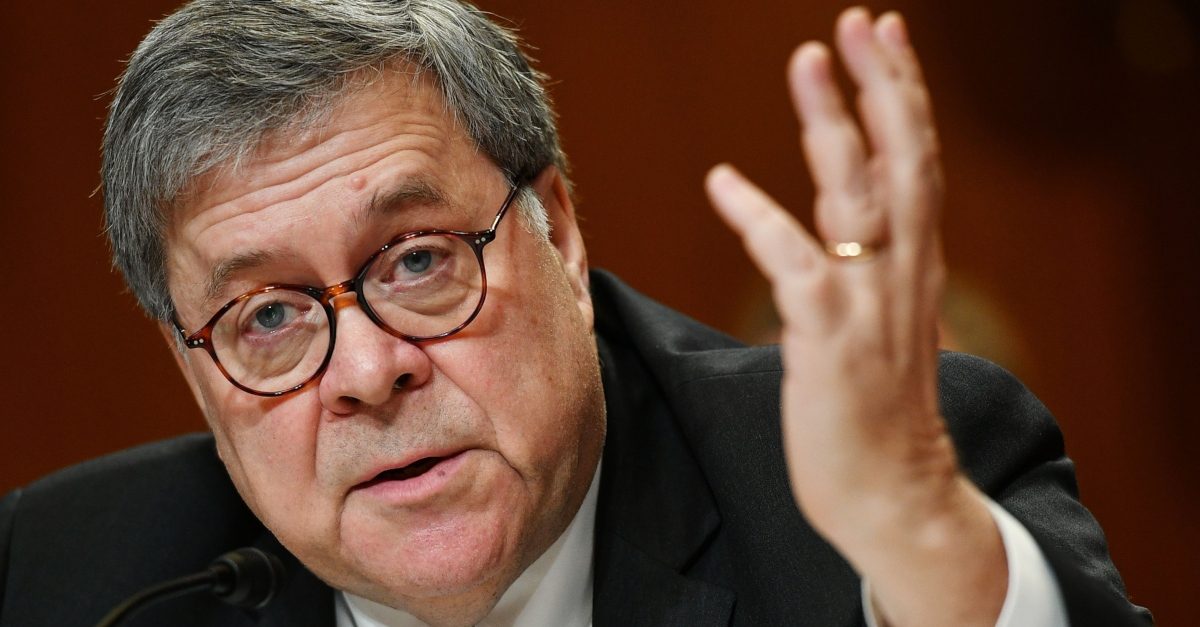
U.S. Department of Justice (DOJ) has advised U.S. Attorneys’ Offices that a longstanding policy prohibiting the department from interfering in U.S. elections will no longer preclude prosecutors who suspect election fraud from taking public investigative steps, even in the hours before polls close on Nov. 3, ProPublica reported Wednesday.
An email from the DOJ’s Public Integrity Section (PIS) sent Friday announced an “exception to the general non-interference policy”—if a U.S. Attorney’s Office suspects fraud that involves postal workers or military employees.
According to the report, the email specified that the exception applies to circumstances in which “the integrity of any component of the federal government is implicated by election offenses within the scope of the policy including but not limited to misconduct by federal officials or employees administering an aspect of the voting process through the United States Postal Service, the Department of Defense or any other federal department or agency.”
Despite the broad language, the DOJ’s decision to specifically cite postal workers and military employees appears to be aimed at reiterating at a series of false allegations and conspiracy theories aimed at attacking the security of voting by mail that have been pushed by U.S. Attorney General Bill Barr and President Donald Trump in recent weeks.
For example, in an interview with the Chicago Tribune in mid-September, Barr claimed–without any supporting evidence whatsoever–that voting by mail would inevitably lead to the “selling and buying” of votes, erroneously claiming that postal workers could simply be bribed to hand over ballots.
“So now we’re back in the business of selling and buying votes. Capricious distribution of ballots means (ballot) harvesting, undue influence, outright coercion, paying off a postman, here’s a few hundred dollars, give me some of your ballots,” the attorney general said.
One recent example of a postman committing election fraud involved Thomas Cooper, who altered mail-in ballot request applications by changing the applicant’s party from Democrat to Republican.
At the time of this writing, the DOJ announced charges against 26-year-old Nicholas Beauchene, a mail carrier in New Jersey.
The last Republican presidential candidate to win New Jersey was George H.W. Bush in 1988; Hillary Clinton (D) beat Trump by roughly 14-percent in the Garden State.
Beauchene is “accused of dumping 1,875 pieces of mail in two dumpsters, one in North Arlington and the other in West Orange,” CNN reported. North Arlington is in Bergen County and West Orange is in Essex County. Clinton won both counties in 2016. The vote in Bergen County was Clinton 231,211, Trump 175,529; the vote in Essex County was Clinton 240,837, Trump 63,176.
“The mail in the North Arlington dumpster contained 98 general election ballots; mail found in the West Orange dumpster had one general election ballot,” CNN reported. “All of the mail, according to the DOJ, was eventually delivered.”
More recently, Barr “personally briefed” President Trump on a DOJ investigation into a handful of discarded military ballots recovered in Pennsylvania resulting in the U.S. attorney’s Office issuing a highly controversial statement claiming all nine of the recovered ballots were cast for Trump. The statement required almost immediate revision, as not all of the recovered ballots were even opened, but not before Trump and White House Press Secretary Kayleigh McEnany amplified those claims through public statements erroneously contending that it supported allegations of widespread voter fraud.
“Every DOJ prosecutor and agent must remember that they represent the United States of America, not Bill Barr or Donald Trump,” said attorney Daniel Goldman, who previously served as majority counsel in the House impeachment inquiry against Trump. “There is no place in our system of justice for the DOJ to interfere in elections, which this policy change is designed to do.”
Justin Levitt, a law professor at Loyola Law School and former deputy assistant attorney general in the DOJ’s civil rights division, said the new election interference exception, coupled with the aforementioned examples, likely portends more controversial moves from the department.
“Given the M.D. Penn. nonsense, until DOJ makes clear there will be zero tolerance for premature/partisan press releases of incomplete investigations, I think what we should expect is … premature/partisan press releases of incomplete investigations,” Levitt wrote on Twitter. “Also think it’s worth emphasizing that for _real_ investigations, this is profoundly counterproductive. What happened in Luzerne got local officials plenty wary of contacting DOJ for investigation help. This policy change is going to supercharge that.”
Former director of the office of public affairs at the Obama DOJ Matthew Miller similarly said the new policy exception was “dangerous foreshadowing” of what’s to come.
“Dangerous foreshadowing of what Barr has planned. This policy has worked well for decades, and there is no law enforcement reason to change it,” he wrote.
[image via MANDEL NGAN_AFP_Getty Images]